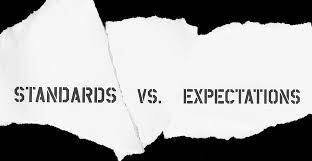Introduction
In the pursuit of success and happiness, individuals often grapple with the interplay between standards and expectations. While these terms may seem interchangeable, they carry distinct meanings that can significantly impact our well-being and personal growth. This article delves into the intricate relationship between standards and expectations, shedding light on how finding the right balance between the two can lead to a more fulfilling and purposeful life.
Unveiling the Difference: Standards vs Expectations
Defining Standards
Standards refer to the level of quality, performance, or behavior that we set for ourselves. These are the criteria against which we judge our actions and accomplishments. Standards are often influenced by our values, principles, and aspirations.
Understanding Expectations
Expectations, on the other hand, are the anticipated outcomes or results we have in mind. They are often influenced by external factors such as societal norms, cultural influences, and past experiences. Expectations can shape our perceptions of success and happiness.
The Significance of Setting Realistic Standards
Setting realistic standards is essential for personal growth and well-being. Here’s why finding the right balance between high standards and practicality matters:
Fostering a Growth Mindset
Realistic standards encourage a growth mindset, emphasizing progress over perfection. By acknowledging that setbacks are part of the journey, we embrace opportunities for learning and improvement.
Enhancing Self-Compassion
Balanced standards prevent harsh self-judgment and promote self-compassion. We treat ourselves with kindness and understanding, even when we don’t meet our own expectations.
Cultivating Motivation
Achievable standards fuel motivation and drive. When our goals are within reach, we’re more likely to stay committed and maintain our enthusiasm.
Minimizing Stress
Unattainable standards can lead to chronic stress and burnout. Realistic standards promote a healthier work-life balance and contribute to overall well-being.
Managing Expectations: Striving for Balance
Recognizing Unrealistic Expectations
Unrealistic expectations set us up for disappointment and frustration. It’s crucial to identify when our expectations are beyond what is reasonable or achievable.
Embracing Flexibility
Being flexible with our expectations allows us to adapt to changing circumstances. This adaptability reduces stress and promotes a more positive outlook.
Communicating Expectations
Clear communication of expectations in relationships and professional settings is vital. Expressing our needs and boundaries fosters understanding and reduces misunderstandings.
Finding Joy in the Journey
Balanced expectations help us find joy in the process rather than solely focusing on the outcome. We learn to appreciate the small victories along the way.
Also Read How Sometimes Goodbyes Deserve a Second Chance
The Balancing Act: Navigating Life’s Various Aspects
Standards and Career Pursuits
Setting high standards in your career can drive excellence, but it’s essential to avoid becoming a perfectionist. Strive for continuous improvement while acknowledging your achievements.
Standards in Relationships
Healthy relationships are built on mutual respect and understanding. Communicate your standards effectively and be open to compromise.
Expectations in Personal Growth
While it’s natural to have aspirations, avoid placing unrealistic expectations on your personal growth journey. Celebrate progress and embrace self-discovery.
Balancing Health Standards
Maintaining physical and mental health requires setting achievable goals. Focus on sustainable habits that promote well-being rather than pursuing extreme measures.
FAQs
What happens when expectations are too high?
Unrealistic expectations can lead to disappointment, stress, and burnout. It’s important to set expectations that are achievable and aligned with reality.
How do I manage expectations in my personal relationships?
Effective communication is key. Have open and honest conversations about your needs, boundaries, and goals to ensure mutual understanding.
Can setting standards lead to perfectionism?
While setting high standards can drive excellence, it’s important to distinguish between healthy striving and perfectionism. Perfectionism can be detrimental to well-being.
How do I find the right balance between standards and expectations?
Focus on setting standards that are challenging yet attainable. Be adaptable with your expectations, and prioritize self-compassion and personal growth.
Can managing expectations reduce stress?
Yes, managing expectations by embracing flexibility and focusing on the journey can reduce stress and promote a more positive outlook.
Is it possible to have high standards without feeling overwhelmed?
Yes, it is possible. High standards can be motivating and fulfilling when they are balanced with self-compassion and a growth mindset.
Conclusion
Striking the right balance between standards and expectations is a delicate yet transformative endeavor. By setting realistic standards and managing expectations, we empower ourselves to pursue personal growth, happiness, and fulfillment. Whether in our careers, relationships, or personal development journeys, the interplay between these two concepts shapes our outlook on life. Remember, it’s not about lowering your ambitions, but about approaching them with a sense of wisdom, adaptability, and self-kindness. So, are you ready to embark on the journey of finding balance and unlocking your true potential?
Positivity is a mindset that can be cultivated over time. If you’re interested in learning more, our Positive Life Blog has a plethora of articles waiting for you.
